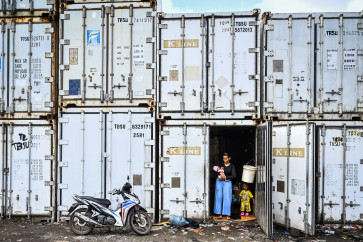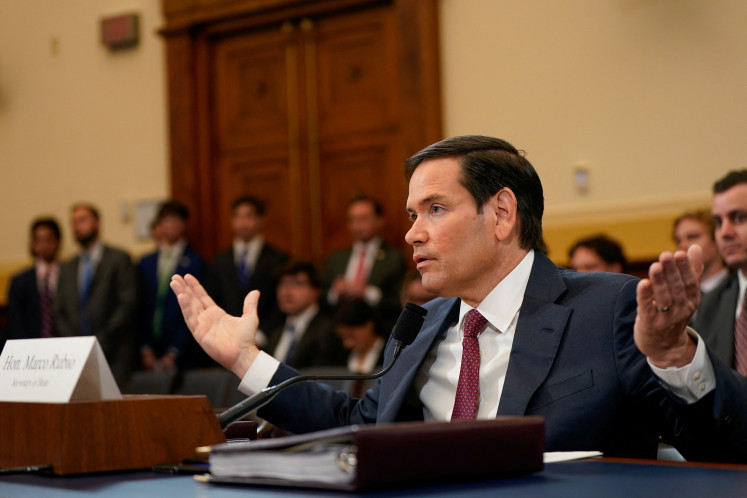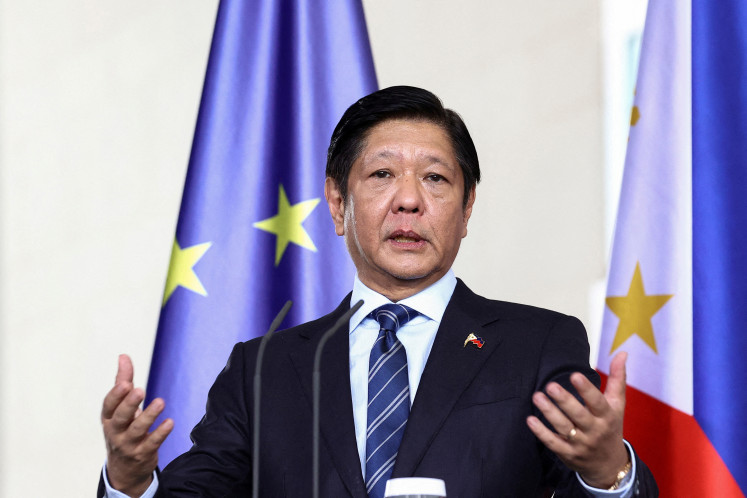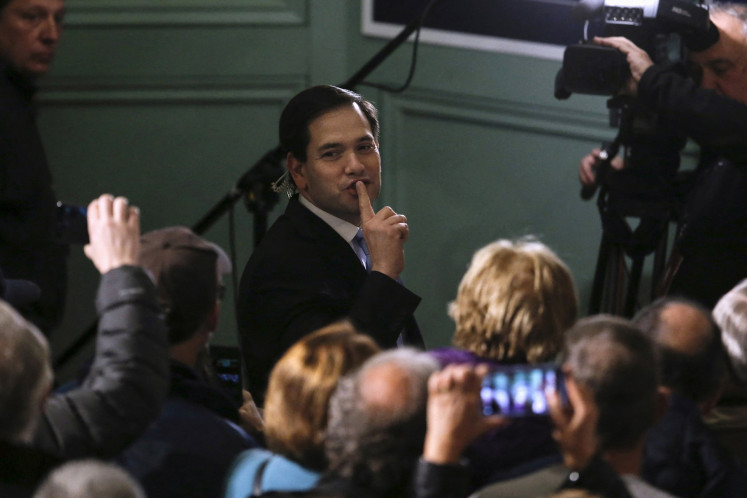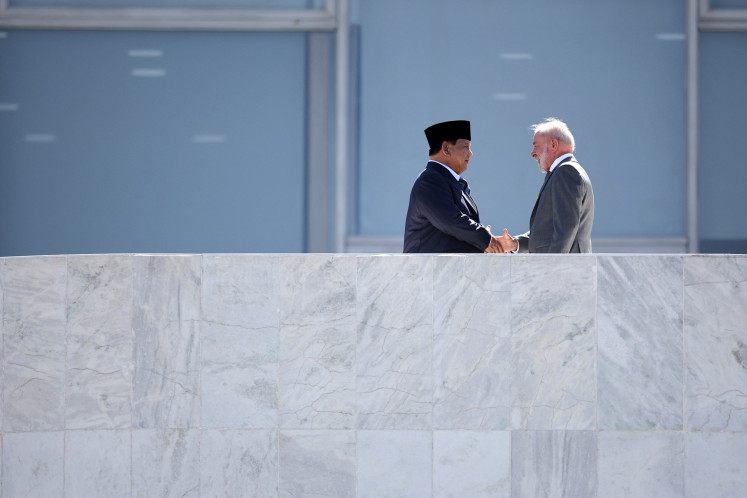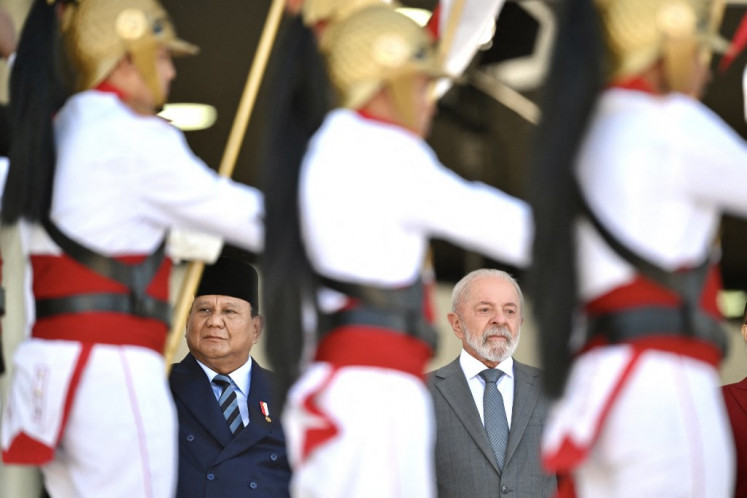Popular Reads
Top Results
Can't find what you're looking for?
View all search resultsPopular Reads
Top Results
Can't find what you're looking for?
View all search resultsFive nations including US, Russia, China vow to prevent nuclear war
China hailed the statement as the first of its kind released by the leaders of the five so-called nuclear-weapon states on the issue of nuclear arms. But whether any progress will materialize toward the goal of nuclear disarmament is unclear amid the growing rivalry between the United States and China.
Change text size
Gift Premium Articles
to Anyone
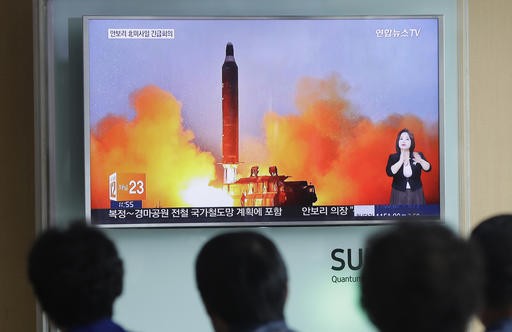 In this June 23, 2016, file photo, people watch a TV news channel airing an image of North Korea's ballistic missile launch published in North Korea's Rodong Sinmun newspaper at the Seoul Railway Station in Seoul, South Korea. North Korea could soon be capable of targeting America with nuclear weapons. What can the U.S. do to stop it? Diplomacy and economic sanctions have not worked so far. Republican presidential candidate Donald Trump says the U.S. can put more pressure on China to rein in its North Korean ally. Democrat Hillary Clinton wants the world to intensify sanctions as the Obama administration did with Iran, a course that eventually opened the way for a deal to contain its nuclear program. ( .AP/Ahn Young-joon, File)
In this June 23, 2016, file photo, people watch a TV news channel airing an image of North Korea's ballistic missile launch published in North Korea's Rodong Sinmun newspaper at the Seoul Railway Station in Seoul, South Korea. North Korea could soon be capable of targeting America with nuclear weapons. What can the U.S. do to stop it? Diplomacy and economic sanctions have not worked so far. Republican presidential candidate Donald Trump says the U.S. can put more pressure on China to rein in its North Korean ally. Democrat Hillary Clinton wants the world to intensify sanctions as the Obama administration did with Iran, a course that eventually opened the way for a deal to contain its nuclear program. ( .AP/Ahn Young-joon, File)
T
he United States, Russia, China and two other countries with nuclear weapons on Monday issued a joint statement affirming that nuclear war must be avoided and that the role of such armaments should be limited to defensive purposes and to deter aggression.
China hailed the statement as the first of its kind released by the leaders of the five so-called nuclear-weapon states on the issue of nuclear arms. But whether any progress will materialize toward the goal of nuclear disarmament is unclear amid the growing rivalry between the United States and China.
"We affirm that a nuclear war cannot be won and must never be fought," the five countries, including Britain and France, said in the statement.
"As nuclear use would have far-reaching consequences, we also affirm that nuclear weapons -- for as long as they continue to exist -- should serve defensive purposes, deter aggression, and prevent war," they added.
The latest move came as US President Joe Biden is committing to take steps toward reducing the role of nuclear weapons, in a shift from his predecessor Donald Trump who was criticized for undermining past efforts to curb the dangers of such arsenals.
The five nations are officially recognized as possessing nuclear weapons by the Nuclear Non-Proliferation Treaty. Under the NPT, nuclear powers pledge to work toward disarmament in exchange for promises from non-nuclear states not to acquire the devastating weapons.
But frustration has been growing among the nuclear have-nots over the lack of progress on ridding the world of nuclear weapons.
The joint statement was formulated with an intention of coinciding with a UN conference to review the implementation of the NPT slated to begin Tuesday in New York, Russia's Tass news agency said, citing remarks by Russian Foreign Ministry spokeswoman Maria Zakharova.
The meeting was postponed at the last minute due to a surge in coronavirus cases in the United States, but the five countries decided to release the statement "given the importance" of the content, she said, stressing Moscow's initiative in drafting the document.
The five countries said they "remain committed" to NPT obligations, which include pursuing negotiations "in good faith" on measures related to halting the nuclear arms race at an early date and pursuing nuclear disarmament.
Expressing their "desire to work with all states to create a security environment more conducive to progress on disarmament," the five nations said the ultimate goal is "a world without nuclear weapons with undiminished security for all."
They also pledged to make efforts to avoid military confrontation and increase mutual understanding through bilateral and multilateral approaches.
In Japan, the world's sole country to have suffered atomic bombings, antinuclear campaigners welcomed the statement.
"I feel the long-held wishes of the people in the world, especially the atomic bomb survivors of Hiroshima and Nagasaki and the citizens there, have become a reality," said Nobuto Hirano, a 75-year-old co-representative of a civic group involved in sending high school students to the United Nations to deliver peace messages.
While noting that the motivations behind the statement may vary among countries, Hirano said he would like to take the move "positively" and hopes the world will move toward eliminating nuclear weapons.
Miho Tanaka, a 27-year-old representative of a civic group calling on Japanese parliamentary members to act to abolish nuclear weapons, said the statement is "happy news" following the postponement of the NPT review conference, which has already been repeatedly delayed from its original date in the spring of 2020.
She expressed hope that Japan will play its role as a country aware of the realities of the catastrophic consequences of the use of nuclear weapons.
The US atomic bombs that exploded over Hiroshima and Nagasaki in the final days of World War II killed an estimated 140,000 and 74,000 people, respectively, by the end of 1945.
While a UN treaty banning nuclear weapons entered into force in January last year, none of the five nuclear-weapon states -- veto-wielding permanent members of the U.N. Security Council --have joined it.
Japan has also refrained from signing the pact in consideration of its security alliance with the United States, which provides protection to the Asian country through its nuclear arsenal.
Meanwhile, a race for hypersonic weapons technology seems to be intensifying between the United States and China. Tensions have also been rising between the United States and Russia over speculation that Moscow may take military action on the border with Ukraine.
Additionally, the United States has been warning of China's buildup of its nuclear arsenal, with a Pentagon report saying in November that Beijing is likely to possess at least 1,000 nuclear warheads by 2030.
As of mid-2021, nine countries -- the five nuclear-weapon states as well as India, Israel, North Korea and Pakistan -- possessed roughly 13,150 nuclear warheads, according to the website of the Federation of American Scientists.
The United States and Russia remain the dominant nuclear powers, accounting for about 91 percent of all nuclear warheads, or around 4,000 each, it said.


